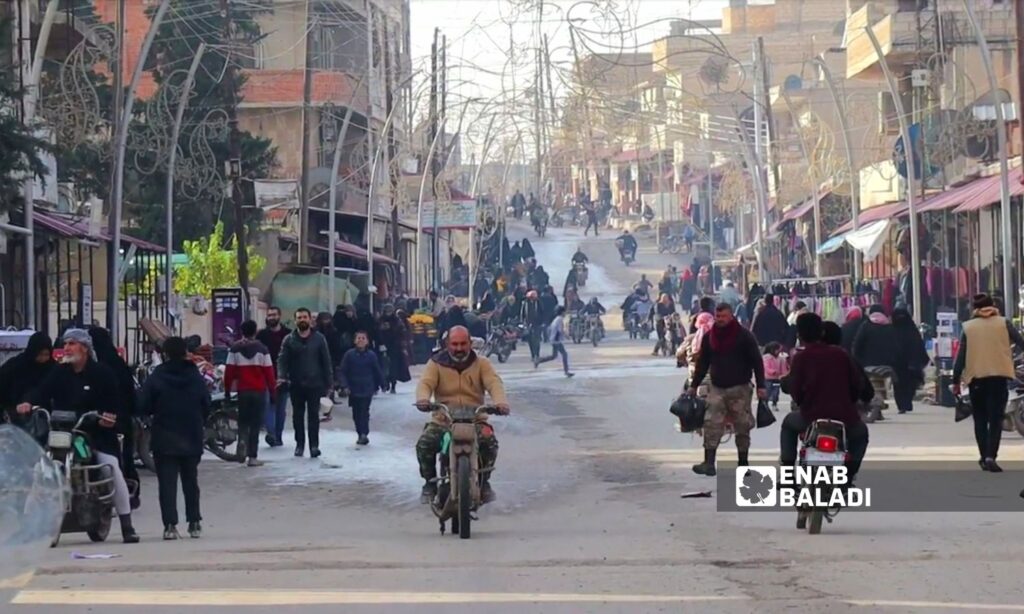Enab Baladi – Ras al-Ain
The Ras al-Ain region in northeastern Syria has recently seen an increase in fraud cases, with the rate of cases recorded at the legal office of the local council in the area exceeding 60% during the second half of 2023.
These cases have resulted in family and tribal disputes in the area, which is predominantly tribal in nature.
The geographical nature of the area has paved the way for fraudsters, some of whom have been recorded fleeing towards areas controlled by the Syrian Democratic Forces (SDF) that are spread around the cities of Ras al-Ain and Tel Abyad, which are under the control of the Turkey-backed Syrian National Army (SNA).
Victims of fraud
Sanaa al-Masoud was defrauded by a person claiming to work in investment, borrowing $11,000 from her but not returning the money to date.
Al-Masoud, who had saved this amount for her sick son’s treatment, decided to invest her money for a short period and entrusted it to someone who promised to return it with a financial interest. She later discovered that she had fallen victim to a fraud operation after the borrower of the money disappeared from the region and she was unable to reach him.
In turn, Farhan al-Amer told Enab Baladi about being defrauded $35,000 after depositing it with someone engaged in sheep trading for investment purposes.
He explained that he received his share of his deceased father’s land valued at $35,000 and then met someone working in the sheep trade who offered to invest his money.
Influenced by the financial gains he imagined, reaching 60% after three months, al-Amer handed over his money to the trader who disappeared four months later with it.
Like other victims of similar fraud operations, al-Amer reported the incident to the security authorities, but the fraudster escaped to the city of al-Tabqa in the countryside of Raqqa governorate, where the Autonomous Administration of North and East Syria (AANES) is in control, closing the case until further notice.
Mazen al-Sudan, who was displaced from Damascus city, also became a victim of significant fraud when someone offered to sell him 100 dunams of agricultural land in the countryside of Ras al-Ain for $150,000.
He said he paid $50,000 upfront, with the rest to be paid upon registering the land in his name. However, after al-Sudan paid the amount, he discovered that the seller did not actually own any agricultural land but rather offered him a plot registered in someone else’s name.
After sustaining financial losses, al-Sudan filed a complaint with the security authorities, but the accused has not been arrested to this day.
Dozens of legal claims monthly
Lawyer Farhan al-Saadoun, a resident of Ras al-Ain city, told Enab Baladi that he receives more than 20 fraud-related legal claims every month, most of which involve money lending operations with “fantastical” interests.
He pointed out that many people who had been defrauded did not enter into an official contract with the person who defrauded them, making it difficult for them to claim their legal rights.
The lawyer emphasized the importance of having official contracts in business or investment activities, an important factor in financial transactions, as these contracts protect both parties from any future disputes or differences and facilitate the claim for legal rights in case of fraud or disagreements.
Al-Saadoun also mentioned the importance of verifying the legitimacy of the company, institution, or individual offering investment opportunities, which can be done by researching their information or contacting the relevant governmental entities within their regions.
Fraud crimes rise by 60%
To gauge the rate of fraud crimes in Ras al-Ain city, Enab Baladi contacted the legal office affiliated with the local council of Ras al-Ain city, which clarified that fraud crimes in Ras al-Ain increased by 60% in the last six months of 2023 compared to the preceding six months.
The office added that two cases of fraud were registered in the current January, while the total fraud cases during the second half of 2023 amounted to seven.
The rise in crimes was attributed to the absence of laws mandating people to enter into contracts with each other.
Fraudsters exploit the lack of these laws by offering “attractive” proposals to people, taking their money in exchange for non-existent services or products, according to the legal office.
Particularly, fraudsters target individuals seeking job or investment opportunities, or those in urgent need of money, taking advantage of the presence of isolated areas of influence in Syria, which makes tracking and arresting them difficult.
Fraudulent cases cause tension in Ras al-Ain
Due to the increase in fraud, tension levels among families and tribes in Ras al-Ain city have risen, sometimes escalating to threats and intimidation.
To avoid tribal clashes, some of those involved in such disputes decided to leave Ras al-Ain city, while others were forced to give up all their properties, including lands and homes, to settle the commitments of one of their family members against other individuals through similar fraud operations.
These tensions come against the backdrop of the escalation of fraud cases, as the area witnessed a dispute between the al-Akidat tribe and the Adwan tribe over a million-dollar fraud case.
Ras al-Ain is located on the Turkish border, controlled by the Syrian National Army with Turkish support, under the political umbrella of the Syrian Interim Government (SIG), surrounded by fronts of conflict with the SDF, and the Turkish border is the only point of access to the outside world, in addition to smuggling routes that connect it with SDF controlled areas.

